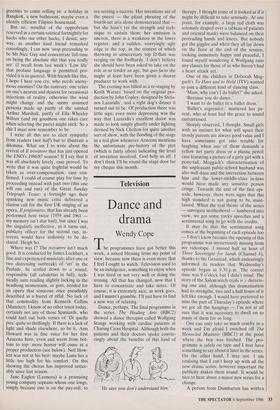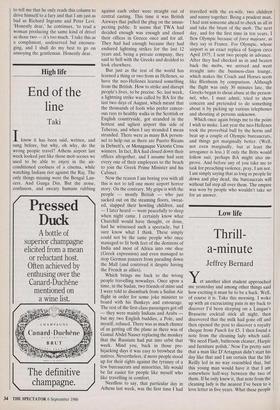Television
Dance and drama
Wendy Cope
The programmes have got better this week, a mixed blessing from my point of view, because now there is even more that I feel I ought to watch. Television used to be an indulgence, something to enjoy when I was tired or not very well or doing the ironing. All that has changed, now that I have to concentrate and take notes. Of course, it is extremely nice, as work goes, and I mustn't grumble. I'll just have to find a new way of relaxing.
Dance, perhaps. The final programme in the series The Healing Arts (BBC2) showed a dance therapist called Wolfgang Stange working with cardiac patients at Charing Cross Hospital. Although both the patients and their doctors spoke convin- cingly about the benefits of this kind of 'He says you don't understand him.' therapy, I thought some of it looked as if it might be difficult to take seriously. At one point, for example, a large red cloth was solemnly draped over a tableau of patients and oriental masks were balanced on their protruding hands and knees. But nobody got the giggles and when they all lay down on the floor at the end of the session, looking immensely happy and peaceful, I found myself wondering if Wolfgang runs any classes for those of us who haven't had a heart attack yet.
One of the children in Deborah Mog- gach's To Have and to Hold (ITV) wanted to join a different kind of dancing class. 'Mum, why can't I do ballet?' she asked. 'Because you do dance.'
'I want to do ballet in a ballet dress.'
'Ballet's regressive,' muttered her pa- rent, who at least had the grace to sound embarrassed.
Sharply observed, I thought. Small girls with an instinct for what will upset their trendy parents are always good value and I have sometimes got into trouble for laughing when one of them demands a yellow net party dress or a plastic pencil case featuring a picture of a girly girl with a pony-tail. Moggach's characterisation of the unpleasant public-school husband was also well done and the interaction between him and the lower-middle-class in-laws would have made any sensitive person cringe. Towards the end of the first epi- sode, however, there were signs that this high standard• is not going to be main- tained. When the real theme of the series — surrogate motherhood — lumbered into view, we got some yucky speeches and a sentimental song to go with the credits.
It may be that the sentimental song comes at the beginning of each episode too — I don't know because the opening of this programme was mysteriously missing from my videotape. I missed half an hour of Three Sovereigns for Sarah (Channel 4), thanks to the Grauniad, which endearingly informed its readers that Wednesday's episode began at 9.30 p.m. The correct time was 9 o'clock but I didn't mind. The story of the Salem witch trials is a distress- ing one and, although this dramatisation had its strengths, two and a half hours of it felt like enough. I would have preferred to miss the part of Thursday's episode where we got all the hangings — I'm not at all sure that it was necessary to dwell on so many of them for so long.
One can only take so much cruelty in a week and I'm afraid I switched off The Monocled Mutineer (BBC1) at the point where the boy was birched. The pro- gramme is safely on tape and I may have something to say about it later in the series. On the other hand, I may not. I am realising that I can't keep up with all the new drama series, however important the publicity makes them sound. It would be nice to hear about a minor new series for a change.
A person from Dumbarton has written to tell me that he only reads this column to drive himself to a fury and that I am just as bad as Richai rd Ingrams and Peter Levi. `Honestly dea Lr,' he continues, 'to read a woman produ cing the same kind of drivel as those two - - it's too much. take this as a complimern t, undeserved but encoura- ging, and I ;hall do my best to go on annoying the gentleman. Honestly dear.







































 Previous page
Previous page